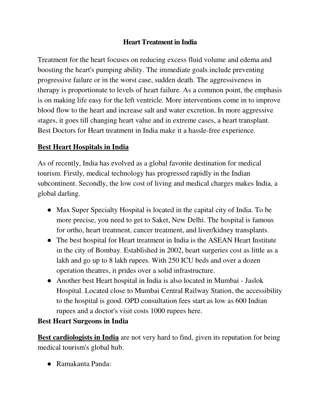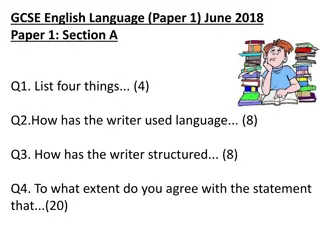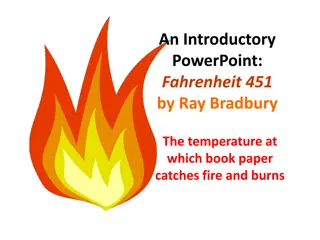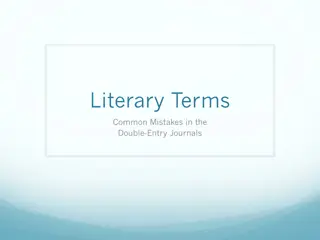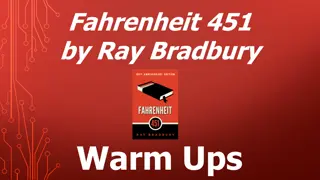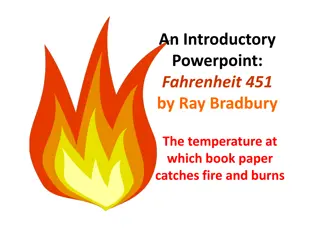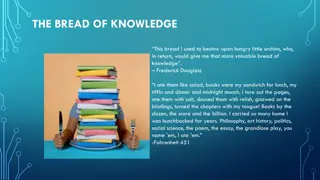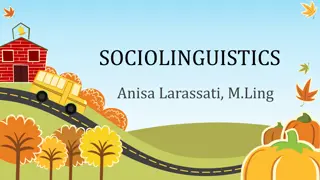Analyzing Language and Structure in Fahrenheit 451 and The Tell Tale Heart
Explore how language is used to portray characters in Fahrenheit 451 and The Tell Tale Heart and analyze the text structure to captivate readers' interest. Dive into the depiction of Montag's demeanor and the narrator's confidence in avoiding detection in these iconic literary works.
Download Presentation

Please find below an Image/Link to download the presentation.
The content on the website is provided AS IS for your information and personal use only. It may not be sold, licensed, or shared on other websites without obtaining consent from the author.If you encounter any issues during the download, it is possible that the publisher has removed the file from their server.
You are allowed to download the files provided on this website for personal or commercial use, subject to the condition that they are used lawfully. All files are the property of their respective owners.
The content on the website is provided AS IS for your information and personal use only. It may not be sold, licensed, or shared on other websites without obtaining consent from the author.
E N D
Presentation Transcript
Q2: How does the writer use language to present the man within this extract? You have 15 minutes to plan out as many ideas as you can Extract from Fahrenheit 451 by Ray Bradbury (1953) IT WAS A PLEASURE TO BURN IT was a special pleasure to see things eaten, to see things blackened and changed. With the brass nozzle in his fists, with this great python spitting its venomous kerosene upon the world, the blood pounded in his head, and his hands were the hands of some amazing conductor playing all the symphonies of blazing and burning to bring down the tatters and charcoal ruins of history. With his symbolic helmet numbered 451 on his stolid head, and his eyes all orange flame with the thought of what came next, he flicked the igniter and the house jumped up in a gorging fire that burned the evening sky red and yellow and black. He strode in a swarm of fireflies. He wanted above all, like the old joke, to shove a marshmallow on a stick in the furnace, while the flapping pigeon-winged books died on the porch and lawn of the house. While the books went up in sparkling whirls and blew away on a wind turned dark with burning. Q3: How has the writer structured the text to interest you as a reader? You have 15 minutes to plan out as many ideas as you can Montag grinned the fierce grin of all men singed and driven back by flame. Q4: A student, having read this section of the text said, The writer clearly portrays Montag as an insane character. To what extent do you agree? You have 15 minutes to plan out as many ideas as you can He knew that when he returned to the firehouse, he might wink at himself, a minstrel man, burnt corked, in the mirror. Later, going to sleep, he would feel the fiery smile still gripped by his face muscles, in the dark. It never went away, that. smile, it never ever went away, as long as he remembered. He hung up his black-beetle-coloured helmet and shined it, he hung his flameproof jacket neatly; he showered luxuriously, and then, whistling, hands in pockets, walked across the upper floor of the fire station and fell down the hole. At the last moment, when disaster seemed positive, he pulled his hands from his pockets and broke his fall by grasping the golden pole. He slid to a squeaking halt, the heels one inch from the concrete floor downstairs. He walked out of the fire station and along the midnight street toward the subway where the silent, air-propelled train slid soundlessly down its lubricated flue in the earth and let him out with a great puff of warm air an to the cream-tiled escalator rising to the suburb. Whistling, he let the escalator waft him into the still night air. He walked toward the comer, thinking little at all about nothing in particular. Before he reached the corner, however, he slowed as if a wind had sprung up from nowhere, as if someone had called his name.
Q2: Look at the section in bold. How does the writer use language here to describe the narrator s confidence he won t be caught? You have 15 minutes to plan out as many ideas as you can Extract from The Tell Tale Heart by Edgar Allen Poe (1843) I then took up three planks from the flooring of the chamber, and deposited all between the scantlings. I then replaced the boards so cleverly, so cunningly, that no human eye --not even his --could have detected any thing wrong. There was nothing to wash out --no stain of any kind --no blood-spot whatever. I had been too wary for that. A tub had caught all --ha! ha! When I had made an end of these labors, it was four o'clock --still dark as midnight. As the bell sounded the hour, there came a knocking at the street door. I went down to open it with a light heart, --for what had I now to fear? There entered three men, who introduced themselves, with perfect suavity, as officers of the police. A shriek had been heard by a neighbour during the night; suspicion of foul play had been aroused; information had been lodged at the police office, and they (the officers) had been deputed to search the premises. Q3: How has the writer structured the text to interest you as a reader? You have 15 minutes to plan out as many ideas as you can I smiled, --for what had I to fear? I bade the gentlemen welcome. The shriek, I said, was my own in a dream. The old man, I mentioned, was absent in the country. I took my visitors all over the house. I bade them search --search well. I led them, at length, to his chamber. I showed them his treasures, secure, undisturbed. In the enthusiasm of my confidence, I brought chairs into the room, and desired them here to rest from their fatigues, while I myself, in the wild audacity of my perfect triumph, placed my own seat upon the very spot beneath which reposed the corpse of the victim. The officers were satisfied. My manner had convinced them. I was singularly at ease. They sat, and while I answered cheerily, they chatted of familiar things. But, ere long, I felt myself getting pale and wished them gone. My head ached, and I fancied a ringing in my ears: but still they sat and still chatted. The ringing became more distinct: --It continued and became more distinct: I talked more freely to get rid of the feeling: but it continued and gained definiteness --until, at length, I found that the noise was not within my ears. Q4: A student, having read this section of the text said, Due to his actions, the narrator is unreliable and his account of events cannot be trusted. To what extent do you agree? You have 15 minutes to plan out as many ideas as you can No doubt I now grew very pale; --but I talked more fluently, and with a heightened voice. Yet the sound increased --and what could I do? It was a low, dull, quick sound --much such a sound as a watch makes when enveloped in cotton. I gasped for breath --and yet the officers heard it not. I talked more quickly --more vehemently; but the noise steadily increased. I arose and argued about trifles, in a high key and with violent gesticulations; but the noise steadily increased. Why would they not be gone? I paced the floor to and fro with heavy strides, as if excited to fury by the observations of the men --but the noise steadily increased. Oh God! what could I do? I foamed --I raved --I swore! I swung the chair upon which I had been sitting, and grated it upon the boards, but the noise arose over all and continually increased. It grew louder --louder --louder! And still the men chatted pleasantly, and smiled. Was it possible they heard not? Almighty God! --no, no! They heard! --they suspected! --they knew! --they were making a mockery of my horror!-this I thought, and this I think. But anything was better than this agony! Anything was more tolerable than this derision! I could bear those hypocritical smiles no longer! I felt that I must scream or die! and now --again! --hark! louder! louder! louder! louder! "Villains!" I shrieked, "dissemble no more! I admit the deed! --tear up the planks! here, here! --It is the beating of his hideous heart!"
Q2: Look at the section in bold. How does the writer use language here to describe the weather on the island? You have 5 minutes to plan out as many ideas as you can Extract from Lord of the Flies (1954) by William Golding Over the island the build-up of clouds continued. A steady current of heated air rose all day from the mountain and was thrust to ten thousand feet; revolving masses of gas piled up until the air was ready to explode. It was early evening, the sun had gone and a brassy glare had taken the place of clear daylight. Even the air that pushed in from the sea was hot and held no refreshment. Colours drained from water and trees and pink surfaces of rock, and the white and brown clouds brooded. Nothing moved but the flies who blackened the pig s head and made the spilt guts look like a heap of glistening coal. Even when the vein broke in Simon's nose and the blood gushed out the flies left him alone, preferring the pig s high flavour. Q3: How has the writer structured the text to interest you as a reader? You have 5 minutes to plan out as many ideas as you can With the running of the blood Simon s fit passed into the weariness of sleep. He lay in the mat of creepers while the evening advanced and the thunder continued to rumble. At last he woke and saw dimly the dark earth close by his cheek. Still he did not move but lay there, his face sideways on the earth, his eyes looking dully before him. Then he turned over wearily, drew his feet under him and got hold of the creepers to pull himself up. When the creepers shook, the flies exploded from the pig s guts with a vicious note and clamped back on again. Simon carefully got to his feet. The light was unearthly. The pig s head hung on its stick like a black ball. Simon spoke aloud to the clearing. Q4: A student, having read this section of the text said, The writer vividly conveys how Simon feels and moves. It is as if you are on the island with the narrator. To what extent do you agree? You have 5 minutes to plan out as many ideas as you can What else is there to do? Nothing replied. Simon turned away from the open space and crawled through the creepers till he was in the dusk of the forest. He walked drearily between the trunks, his face empty of expression, and the blood was dry round his mouth and chin. A buffet of wind made him stagger and he saw that he was out in the open, on rock, under a brassy sky. He found his legs were weak and his tongue gave him pain all the time. When the wind reached the mountaintop he could see something: a humped thing suddenly sat up and look down at him.
Q2: Look at the section in bold. How does the writer use language here to describe the scene around Cassandra? You have 5 minutes to plan out as many ideas as you can Extract from I Capture the Castle (1948) by Dodie Smith I write this sitting in the kitchen sink. That is, my feet are in it; the rest of me is on the draining board, which I have padded with our dog's blanket and the tea cosy. I can't say that I am really comfortable, and there is a depressing smell of carbolic soap, but this is the only part of the kitchen where there is any daylight left. And I have found that sitting in a place where you have never sat before can be inspiring; I wrote my very best poem while sitting on the hen house. Though even that isn't a very good poem. I have decided my poetry is so bad that I mustn't write any more of it. Drips from the roof are plopping into the water butt by the back door. The view through the windows above the sink is excessively drear. Beyond the dank garden in the courtyard are the ruined walls on the edge of the moat. Beyond the moat, the boggy ploughed fields stretch to the leaden sky. I tell myself that all the rain we have had lately is good for nature, and that at any moment spring will surge on us. I try to see leaves on the trees and the courtyard filled with sunlight. Unfortunately, the more my mind's eye sees green and gold, the more drained of all colour does the twilight seem. Q3: How has the writer structured the text to interest you as a reader? You have 5 minutes to plan out as many ideas as you can It is comforting to look away from the windows and towards the kitchen fire, near which my sister Rose is ironing though she obviously can't see properly, and it will be a pity if she scorches her only nightgown. (I have two, but one is minus its behind.) Rose looks particularly fetching by firelight because she is a pinkish person; her skin has a pink glow and her hair is pinkish gold, very light and feathery. Although I am rather used to her I know she is a beauty. She is nearly twenty one and very bitter with life. I am seventeen, look younger, feel older. I am no beauty but have a neatish face. Q4: Focus on the part in bold. A student, having read this section of the text said: The writer portrays the two girls as having a romantic lifestyle. To what extent do you agree? You have 5 minutes to plan out as many ideas as you can I have just remarked to Rose that our situation is really rather romantic: two girls in this strange and lonely house. She replied that she saw nothing romantic about being shut up in a crumbling ruin surrounded by a sea of mud. I must admit that our home is an unreasonable place to live in. Yet I love it. The house itself was built in the time of Charles II, but it was grafted on to a fourteenth century castle that had been damaged by Cromwell. The whole of our east wall was part of the castle; there are two round towers in it. The gatehouse is intact and a stretch of the old walls at their full height joins it to the house. And Belmotte Tower, all that remains of an even older castle, still stands on its mound close by. But I won't attempt to describe our peculiar home fully until I can see more time ahead of me than I do now. I am writing this journal partly to practise my newly acquired speed writing and partly to teach myself how to write a novel I intend to capture all our characters and put in conversations. It ought to be good for my style to dash along without much thought, as up to now my stories have been very stiff and self conscious. The only time father obliged me by reading one of them, he said I combined stateliness with a desperate effort to be funny. He told me to relax and let the words flow out of me.
Q2: Look at the section in bold. How does the writer use language here to describe the sounds of the monks? You have 5 minutes to plan out as many ideas as you can Extract from Beautiful Ghosts (2004) by Eliot Pattison There are sounds in Tibet heard nowhere else in the world. Hollow moans inexplicably roll down the slopes of snowcapped peaks. Rumbles like thunder course through valleys under cloudless skies. On moonlit nights in the mountain wilderness Shan Tao Yun had heard tiny ringing tones floating down from the stars. At first, lying on his gulag prison bunk, Shan had felt fear at hearing such eerie sounds. Later he had decided they had to be the workings of the thin, high altitude atmosphere and the wind, of shifting ice formations and temperature changes between summits and valleys, had concluded there were scientific explanations. But after five years Shan was no longer certain. After so long in Tibet, he had abandoned most of his prior beliefs about the workings of the world. Q3: How has the writer structured the text to interest you as a reader? You have 5 minutes to plan out as many ideas as you can Certainly the wrenching sound that now rose across the bowl in the mountains could have no explanation in the physical world. A young woman standing near Shan groaned, clapped her hands to her ears, and ran away. The first time he had heard the sound that came from the red-robed man sitting thirty feet away, Shan, too, had shuddered and wanted to flee. Throat chanting, the monks called the strange grinding moan, but Shan preferred the description used by his old friend and former cellmate Lokesh. Soul rattling, Lokesh called what Surya, the old monk, was doing, explaining that in the world below, souls were often so undeveloped that the only time the sound was heard was in those near death as the soul struggled for release. But in Tibet no one spoke in fearful tones of the death rattle. Here the sound was for the living. Here the devout had learned to make souls speak without tongues. Q4: A student, having read this section of the text, said, Shan feels lonely and isolated. He clearly does not belong here. To what extent do you agree? You have 5 minutes to plan out as many ideas as you can Shan watched the woman retreat with a pang of sorrow. It was a day of great joy, but one of even greater danger. The outlaw monks Shan lived with, who for decades had remained hidden in their secret hermitage, had decided not only to reveal themselves to the hill people but to lead the strangers in illegal rituals. This would be a day of wonderful surprises, Gendun, their senior lama, had declared, one of the days when the world was changed. Shan had warned the monks about the danger of bringing these particular Tibetans to the ruined monastery. Gendun had replied by dropping onto one knee and turning over a pebble, invoking a teaching the monks sometimes used. The world could be changed by the subtlest of actions, so long as it was pure, and even the smallest of actions was pure so long as it was free of fear and anger. But these herders had been conditioned by fear all their lives.





